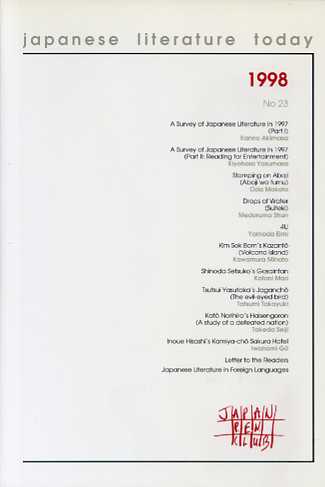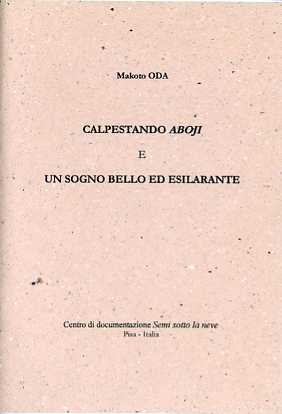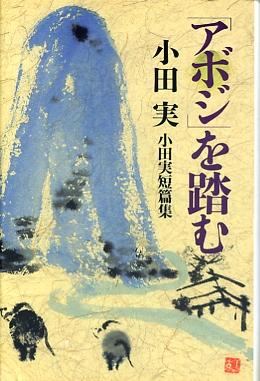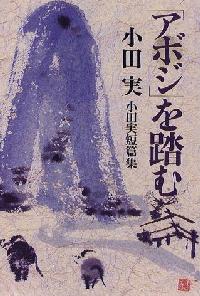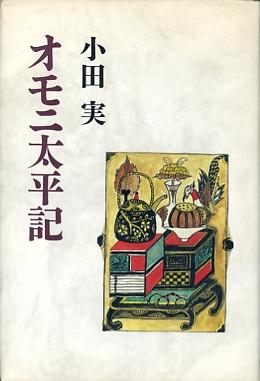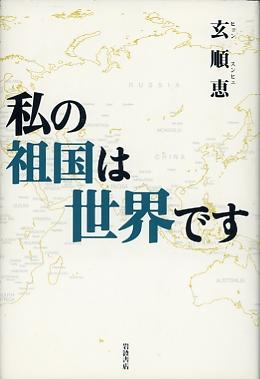Stomping on Aboji [n 1]
By Oda Makoto
Translated by William Wetherall
A version of this translation appeared in
Japanese Literature Today, Number 23, 1998, pages 16-25
First posted June 1999
Last updated 7 August 2015
Revisions are shown in purple.
Addenda are shown in blue.
Introduction
"Stomping on Aboji" first appeared as "'Aboji' o fumu" in Gunzo, Vol. 51, No. 10, October 1996, pages 84-93.
Oda Makoto, born in 1932, received the 24th Kawabata Yasunari Prize for Literature in 1997 for the story, which was then anthologized in the following collection of seven stories.
Oda Makoto
'Aboji' o fumu
[Stomping on "Aboji"]
Tokyo: Kodansha, 1998
292 pages, hardcover
Oda and previously published a collection of vignettes about his Korean mother-in-law and father-in-law, a diver woman and boatman who were born on Cheju island.
Oda Makoto
Omoni Taiheiki
[Omoni Cronicle of the Great Peace]
Tokyo: Asahi Shinbun Sha, 1990
282 pages, hardcover
Omoni and "Aboji"
Oda's reference to his in-laws as mother (omoni) and father (aboji) reflects the common practice of spouses in Japan and Korea to address and refer to parents-in-law as they would their own parents. That he uses the Korean terms rather than the Japanese terms seems to express his deep respect for his in-laws as Koreans.
Why Oda bracketed both aboji and omoni in the later work ("Aboji" o fumu) but bracketed neither term in the earlier work (Omoni Taiheiki) is a bit of a puzzle.
Stomping on Aboji"I'm going back the way I am," Aboji said to me. He was still healthy at the time. Had he, with these words, just declared his resolve, or been asking me to make the arrangements? Undoubtedly both. After he died, we were to put his coffin and all on a plane and send him back. According to Aboji, a Japanese airlines wouldn't do it, but a Republic of Korean plane would. A number of Aboji's friends and acquaintances from the same province had "gone back the way they were" in this manner. In both their and Aboji's cases, the "going back the way one is" destination was Cheju island. There the dead are buried in the ground. They are buried in the ground, and they sleep in the graveyards of generation after generation of their ancestors. Aboji had come by boat from Cheju to Osaka at the age of seventeen, over sixty years ago. For there was no work on the island, and he was unable to eat. The situation was the same for his wife Omoni; she too had come to Osaka from Cheju to work. Omoni, a diving woman, went to Tokushima on Shikoku to harvest agar-agar, and became acquainted with and married Aboji, who was rowing boats for the diving women. Aboji was nineteen. Omoni was twenty. She was a big-sister wife, one year his senior. After this they changed addresses and jobs many times, but in the end they settled in Nagata, in Kobe, and lived there during and after the war, until 17 January 1995, the day of the big earthquake. Aboji and Omoni came from Cheju to Osaka on the same boat, though at different times. But while Omoni had come on the Kimigayo Maru, Aboji had taken the Kundae Hwan. "Kundae Hwan" would be called "Kimigayo Maru" in Japanese, but it seems that Aboji had no recollection or intention of having come on the "Kimigayo Maru" [n 2]. And, for Aboji, Korea was Cheju. Not once during his eighty-five-year span of life did he ever go to Seoul. As for Pusan, he'd passed through the airport to change planes for Cheju. "Why not take a bus into the city?" I urged him, but there are no signs he stretched his legs that far. The whole time he stayed in the airport building and puffed cigarettes. "Oda-kun, there was nothing in particular to do in town," Aboji said. I became connected with Aboji, who called me "Oda-kun," because ten-odd years ago I married his youngest daughter. "Became connected" may be a strange way of putting it, but that's how I really feel. And didn't Aboji also think so? At this age I became connected with an Ilbonsaram (Japanese). Life is funny, he said. Aboji had seven daughters. Only daughters, and one had "gone back" to North Korea, but the other six were in Japan, and had their own families, and were living their own lives, in Kobe, Osaka, Tokyo, and Nishinomiya. Aboji's grandchildren, including those in the North, numbered eight. His great-grandchildren, including one in the North, came to three, or was it four? As for the political affiliations of the six daughters in Japan, half were "Japan-resident stateless Koreans" and half were "Japan-resident ROK Koreans," while Aboji and Omoni were "Japan-resident Republic of Koreans," which made things complicated, but it is not my intent here to discuss the particulars of these political affiliations. Essentially, the "North-South division" is an irrational, senseless situation, and a rational explanation is impossible. Were I to try to discuss something for which a rational explanation was impossible, I too would go crazy. Aboji once explained the whole of this irrational and senseless situation to me. "Oda-kun, I was a Korean before Kim-san and Pak-han were born," he said. "Kim-san," of course, is Kim Il Song of the North, and "Pak-han" is Pak Chong Hui of the South. He made this remark at a time when both were still living. [n 3] Among Aboji's seven sons-in-law, the only Japanese is me, Oda-kun. And among Aboji's grandchildren, only my daughter, now in the fifth year of elementary school, is Japanese--Japanese in the sense of having "Japanese nationality" [n 4]. I am a man whose looks and appearance are not very good. To make matters worse, when I first met Aboji and Omoni, I went in my best coat, which had leather elbow patches. It was my intention to dress elegantly, but in Omoni's eyes, I looked like an Ilbonsaram "yakuja" out to deceive and sell off her lovely daughter. "Yakuja" was yakuza, but when called a "yakuja" by Omoni, I immediately lost my aura of importance and became more like a character appearing in a comedy. As for Aboji, he was thinking this guy doesn't have enough money to buy a new coat, and he's trying to cover the threadbare elbows with patches. And the first thing he said was, "Do you have any money? If not, I'll give you some." For a man like Aboji to mouth this wonderful line--he lived off what little savings he had in Nagata in an old partitioned house that had survived the devastation of the war (an incendiary shell had pierced the roof and landed on the second story, but Omoni desperately brandished a flame-beater and fortunately was able to put everything out)--was truly a show of male perversity and vanity. Aboji, who had been a rower of diving women's boats, a laborer, a coolie, a factory hand, an itinerant peddler, a black marketer, and other things, made lots of money after the war from producing rubber boots, which everyone in Nagata at the time had started doing. "Leasing" one machine at a factory somewhere, he made rubber boots and immediately left to sell them, shouldering them himself all the way to Hachinohe and Aomori in the northeastern region. Rubber boots were indispensable to work in the fields. "Oda-kun, my boots sold so fast they were flying," Aboji often said to me. But these money-making days didn't last long. A Korean compatriot partner ran off with what in the present scale of money would be hundreds of millions of yen. Since then, whether he'd taken a long view of life, or hadn't done well no matter how he tried to make money, he entered a life of always silently puffing tobacco and drinking alcohol amidst a female household reigned over by Omoni and the daughters. The tobacco, at first, was the shredded tobacco used in long Korean-style pipes. Later it was paper rolled. Japanese tobacco, Republic of Korean tobacco, North Korean tobacco, Chinese tobacco, western tobacco. The three kinds of tobacco at the end of this list I would buy at and bring back from travel destinations, but any tobacco, he'd smoke slowly and assiduously until it burned his fingers. Watching him, it was obvious he was savoring its taste. He drank makkolli, ginseng liquor, Japanese sake, and whisky. These, too, he drank slowly and assiduously, obviously savoring their taste. But I've got to mention two more things that colored his life. One was pachinko. Every day he did a round or two of the neighborhood pachinko parlors, sometimes winning, sometimes losing. The other was women. Aboji was a man who long ago was called "Gary Cooper" by his daughters. At the time he became connected with me, unfortunately he had already grown old and wrinkles and spots harshly covered his entire face, though traces of those looks clearly remained. On top of this, essentially most men who are liked by women are of gentle disposition, adroit, and solicitous, and Aboji had all three traits. Aboji would say he had work early in the morning and leave without eating breakfast. When Omoni followed him, thinking it unlikely a man his age would have work or anything else that early, Aboji would be at a house somewhere eating breakfast tete-a-tete with an elegant elderly Ilbonsaram woman. This served as an example of his behavior as a whole, so if he was doing this now, at his age, it is not unthinkable that in Aboji's heyday of rubber-boot making and itinerant peddling, wherever the "Korean Gary Cooper" went, be it Hachinohe or Aomori, he was having breakfast tete-a-tete every morning. But Omoni, who had looked out for herself over the years she was a diving woman, and was full of a what-have-lazy-men-including-Aboji-ever-done-for-me sort of mettle, perhaps all the more because of this mettle, said big-hearted things like "Aboji's a knockout. Everyone's going to want to be around him," and disgorged sublime words of wisdom like "We're old now. We've got to get along like friends." It was undoubtedly on account of having this big, gentle heart that Omoni, while picking quarrels with Aboji every day, was through the years still able to continue their life together. If Omoni was a woman who had lived on the manual labor of a diving woman, Aboji was a man who had lived through the years on the manual work of a laborer and other things. This I immediately knew when I saw Aboji's rocklike body. The first time I saw Aboji's body was when we went to a hot spring and bathed together in a stone bath. Mingling with the naked rocks of the stone bath, Aboji's naked body stood rugged. Put more precisely, what remained of a rock that had weathered, worn, and wasted through time, now towered. My daughter, his grand-daughter, who was four at the time, came over from the neighboring women's bath. And to her that rock tower Aboji may have looked like something out of this world. For she hurried right back to the women's bath where her mother and the others were and shouted, "There was a ghost!" Her mother was surprised, but Omoni, as though not hearing her grand-daughter's frantic shouting, merrily and agilely continued swimming between the rocks of the women's stone bath. In the past, Omoni had been a diving woman. And her romance with the "rock ghost" had started from there. Aboji couldn't read. This was the same with Omoni, but they couldn't read even Korean script, hangul, let alone Chinese characters or Japanese kana. This was one thing that along with Aboji's "rock ghost" body clearly showed how strenuous a life the two of them had led, but the two had, of course, never been to a "school" as such, or to anything like one. Yet they had the wisdom and deep insight of the uncommon life that they had built with that strenuous life. I have already mentioned what a marvelous political judgment Aboji handed down regarding the "North-South division." As for Omoni, she was watching television when suddenly she said "That man's evil." A close-up of Nakasone so-and-so's face had appeared on the screen. In response to a screen of the ostentatious funeral rites for Emperor "Showa" she said, "What's the big deal? We do this in my village," venting an historical awareness that once again made me think about the "pedigree" of the Imperial Family. Aboji spoke an idiosyncratic Japanese. Omoni's speech was also idiosyncratic, though I would have to call her blend of Japanese and Korean--or rather the language of Cheju island--"Omonian." When saying "desk and chair" she'd say "desk" in Korean, or rather the island speech of Cheju, Chejuan, but she'd say "chair" in Japanese. When talking with me, a Japanese, though of course it was her intent to speak Japanese, half became Korean, or Chejuan. When talking with Republic of Koreans, half of what Omoni said, intending to use Korean, was Japanese; the grammar systems of Japanese and Korean are the same, and so such formations of "Omonian" could be managed, but Aboji's case was different; he would say things like "The foist (first) time I came, on an introduction from my little sister's husband, I came to a factory that made starch for kimono. Oda-kun, I walked all over the place selling the stuff. I got ten-percent of whatever I sold in one day. There were times I sold one-yen's worth (in one day), but usually I didn't sell anything. Hah, ha, ha. And then I worked at an oil plant. Oda-kun, it was hard work; I'd have to shoulder 130 kilos up and down three flights of stairs. And my legs have been weak ever since," using the language that he'd made his own at the many places he'd done manual work, and in this sense he'd really learned it with his body. Especially interesting was Aboji's way of calling me Oda-kun at odd intervals in his speech, and his rather un-manual-worker-like manner of referring to himself as Boku. I always became somehow nostalgic listening to him talk like this, for my father, who had died quite a while before that, often referred to himself as Boku, and addressed others as "X-kun." Foreigners stubbornly maintain all the customs of a country and society at the time they themselves came, and no doubt in the 1930s, when Aboji first came to Japan on the "Kundae Hwan," both Boku and "X-kun" were common ways of talking [n 5]. This is clear from the fact that, among older Koreans in Japan, there are at times people who even now speak like this, but Aboji's combination of that Boku and Oda-kun intellectualesque manner of talking and the Japanese of a construction-site graduate had power. And what made me feel that power was when he spoke of the time he was arrested by the police, and cruelly bullied, for having made and gone around selling candy, which was prohibited during the war. Perhaps his splendid Gary Cooper looks on top of his reticence cursed him, but the mere black market candy seller was seen as a major independence movement agitator, and on top of being kept in jail for three months he received torture every day. "Oda-kun, I was beaten, really beaten. I was cudgeled on my knees, and knocked down and things, and even now, Oda-kun, it hurts here." He'd rub his knees while saying this. It wasn't that he had adopted a particularly grim manner of talking; he spoke indifferently, yet his words had all the more power. I liked Aboji's Boku and Oda-kun way of talking because, when spoken to by him like that, a sense of intimacy welled up in me, as though I were his friend, more or less in the same way that Omoni saw Aboji was a life companion. This feeling of intimacy was not the sense of intimacy within a father-in-law and son-in-law sort of family relationship. It was a bond in a much freer, and more equal, equable human relationship, the sense of intimacy that is naturally born of such a relationship. In truth even the word "friend" probably didn't cover it. I called his youngest daughter, who I had married, a "life co-traveler," but Aboji too was my "life co-traveler" in a different sense. Before I knew it, I had started feeling this way about him. I was making plans for a trip. The plan was to take a trip with this now aged "life co-traveler" to the northeastern provinces he had once walked through as an itinerant peddler of rubber boots. One day I suddenly said to him, "Aboji, would you like to go to Hachinohe?" The start of the trip could have been anywhere. "Hachinohe" was just the word that happened to come from my mouth. I was surprised when he immediately replied "Oda-kun, that's a great idea. I was thinking of going there once before I die. For I couldn't very well go after I died, could I?" I was surprised again by this last remark, "For I couldn't very well go after I died, could I?" I wondered why he had mentioned the obvious. But in fact it wasn't. On Cheju the dead are buried in the ground. After burying the coffin in the deep hole of a grave, close relatives and connections put dirt into the hole, then they all get on the dirt and stomp it firm. This was so the spirit of the deceased in the earth would not escape. Aboji had been talking about this. To be sure, after he died, Aboji's spirit could not have left the hole of a grave that had been stomped firm. He could not have come flying to Hachinohe. Aboji said to me, who'd been surprised by these words of his and was speechless, "I'm going back the way I am." And then, after this, he added one word, "Oda-kun." However, the Hachinohe trip never took place. While I was procrastinating about putting aside time for the trip, Aboji fell ill. He had lung cancer. And it was already too late. He had half a year. The doctor at the nearby hospital he had entered diagnosed his condition with terrible accuracy. And not just that. He received permission from the doctor to go home for a night, and at 5:46 early in the morning of the day after he had spent the night with Omoni in the familiar partitioned house in Nagata, the ground bellowed and trembled in the middle of the darkness, and in an instant the earthquake took the lives of more than five-thousand people, and knocked apart hundreds of thousands of homes. Aboji's home, too, was shaken from its foundation, though spared the falling of the roof, and received damage tantamount to total destruction. Considerable time passed after the earthquake before some people from the neighborhood finally confirmed their safety, and when they went into the house, it seems the elderly husband and wife that were Aboji and Omoni were just sitting speechless and looking at each other. My "life co-traveler," their youngest daughter, and my daughter, who was their grand-daughter, and I were concerned about their safety, but living in Nishinomiya, we ourselves were victims, and though we knew that Nagata had been destroyed and was burning, we couldn't move. In the meantime, the husband of the daughter who was living in the same Kobe hurried to their place on his motorcycle, rescued the two of them and brought them to an evacuation shelter at a nearby elementary school, and then he and his entire family came to the shelter. The neighborhood hospital where Aboji had been staying as a terminal cancer patient was not a particularly unkind hospital, but the disaster area was a succession of dead and injured, and the hospital could not look after a terminally ill cancer patient like Aboji. Refused readmission to the hospital, he had no choice but to stay at the evacuation shelter. I can easily imagine how bitter the By way of doing everything possible, after Aboji's daughters and their husbands "rescued" him and Omoni from the evacuation shelter and brought them the eight hours by car to the home of the daughter in Osaka, they sent the two of them to the home of Aboji's adopted son on Cheju [n 6]. Everyone wanted them to have some time together in peace, however brief. There was a moment at Kansai Airport when we thought he might choke on his own sputum, but otherwise Aboji literally "really went back the way he was" to Cheju. However, he didn't live long. It appears that at the home of his adopted son on Cheju he did recover his health for a while, but five days later, the families of their daughters in Japan each received a notice of Aboji's death. All this took place less than a month after the earthquake. The three of us in my family went to Cheju for the funeral. For the daughter who had "gone back" to the North it was out of the question from the start, but even among the six daughters in Japan, some were unable to participate in their father's funeral, because of the rationally inexplicable problem of political affiliation. Despite this the daughter in the North and the daughters in Japan were able to talk about their father's death by phone. The adopted son, who came to take care of matters after Aboji's death, also joined in this dialog. It was the first time for the adopted son to talk to the daughter in the North. Inadvertently, this became a "North-South dialog." Everyone wept. We carried the coffin out of the adopted son's home in the pitch dark of early morning. Everyone in the family, including me, had clad ourselves in hemp garments. The men-- this too including me--wore leggings on our legs, and eboshi or headware of that shape on our heads [n 7]; the women attached loops like Christ's crown of thorns to their heads; and the adopted son, as chief mourner, ran a cincture of straw around his hemp clothing. Just before everyone shouldered the coffin to take it outside, I suddenly heard some Japanese coming from the laments of the women's wailing. Aboji's oldest daughter was screaming, while sobbing, "Aboji, why are you leaving us?" Aboji's graveyard was in the middle of the vast wastelands that spread at the foot of Cheju's famous Mt. Halla, and were swept by the cold winds of the February down drafts. It is literally a wasteland graveyard with earth dumplings and rock-enclosed graves rising here and there. Both the earth dumplings and the rock-enclosed graves were the graves of the earth burials of Aboji's ancestors, but the "he came back the way he was" Aboji was in one of the rock-enclosed graves. There was a ritual. Whether because it comes at the final stage of the funeral rites, or is outside these rites, it is a ceremony to which a bonze from a temple does not come. Sutras are read, but the main elements of the ritual are the laments of the women's wailing. When their tears are exhausted, the women immediately begin to cheerfully talk and laugh. Then come more laments. The screams of the wailing reverberate heavily and harshly over the wasteland. I have often thought of Japan's age-old "sending to the plains," for in this practice was present the primitive candor and solemnity of the rituals performed by every culture of every race when burying someone, before Buddhism or whatever created the rituals of the seemingly most sensible funeral rites, and before they were brought into the frontiers called Japan [n 8]. If there was candor and solemnity in the "sending to the plains" of the Man'yo era [n 9], then they were undoubtedly also in the "sending to the plains" that sent off Aboji. And moreover, what I often thought of along with the "sending to the plains" of the Man'yo era was the world of Homer. In the Iliad and the Odyssey, after the heroes grieved, lamented, and exhausted their tears over the death of a blood relative, or close friend, with abandon, they drank and ate with abandon. This too was present in Aboji's "sending to the plains." A cauldron for an outdoor feast was brought just outside the graveyard in the wasteland along with the coffin. There, after everything was finished, everyone, including the wailing heroines, drank and ate with abandon. I too, of course, drank and ate. The male blood relatives who wore the hemp garments carried the coffin on their shoulders. I also shouldered the coffin. And everyone helped place it on the bottom of the deep hole that had been dug in the middle of a new rock enclosure. Then first blood relatives, next close relatives and connections, or everyone, en masse put earth in the hole, and when the earth had filled the hole to above the rock enclosure, everyone climbed on top of the grave. I climbed on, Aboji's youngest daughter, my "life co-traveler" climbed on, and my daughter, Aboji's grand-daughter, who had experienced the earthquake as a third-grader in elementary school, climbed on. Of course the wailing heroines climbed on together with the men. Aboji's oldest daughter, who had sobbed in Japanese at dawn, climbed on. Everyone was to stamp on and solidify the earth so as to not let Aboji's spirit emerge outside from the bottom of the hole of the grave in the rock enclosure and aimlessly wander, and we had climbed up for this operation. Soon, without anyone speaking, the earth stomping operation began. I stomped. My "life co-traveler" stomped. My daughter, Aboji's grand-daughter, stomped. She stomped with such dedication that now and then she'd jump up and throw the weight of her whole body at the earth. Yet I said to her, "Stomp harder!" And I said the same words to myself. I stomped hard. My daughter jumped even higher. "Oda-kun," don't stomp so hard. It hurts. I'm not going anywhere. My house in Nagata is no longer there," Aboji said beneath the soles of my feet. Notes
|
